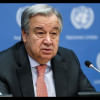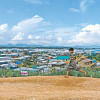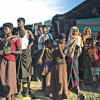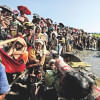It can destabilise entire South Asia
Bangladesh yesterday said presence of nearly one million Rohingya refugees in its territory has the potential to destabilise South Asia and favoured implementation of the Kofi Annan report in its entirety without any precondition to solve the crisis.
Addressing a media conference after wrapping up his two-day visit to India, Bangladesh Foreign Secretary Shahidul Haque, who met his Indian counterpart S Jaishankar and National Security Adviser Ajit Doval yesterday, said the presence of so many Rohingyas was a “huge burden” on the country's small economy as well as a security issue.
“It has the potential to destabilise not only Bangladesh but the entire region. It has ingredients to becoming a security threat,” he asserted.
Asked if Bangladesh shared India's concerns over the possibility of Rohingyas turning into a security threat, Haque said, “We also believe that the Rohingya issue has the potential to destabilise the region. We are speaking in the same language on this.”
On how supportive India has been to Bangladesh on the Rohingya issue, he added, “The people of Bangladesh are very appreciative of India's role in coping with the situation. In terms of sending relief materials, India tops the list. The people of Bangladesh and the government of Bangladesh are happy about India's role.”
He further said India has always stood by Bangladesh on the Rohingya issue “and I have no doubt about India's support to Bangladesh to help stabilise the situation.”
Haque said ever since the present phase of Rohingya crisis erupted, he had met the Indian foreign secretary in Colombo and New York before yesterday's meeting in New Delhi.
“The impression I got is that India will always stand by Bangladesh, especially in times of difficulty,” he remarked.
Asked about India's decision to deport an estimated 40,000 Rohingyas, Haque said, “I will not comment on India's decision. But we hope consideration will be given to the human rights aspect of it.”
The Bangladesh top diplomat said his country already had about 4.5 lakh Rohingyas since 1978-79 and another over five lakh have poured in since August this year.
Replying to a question, Haque said there was no timeframe for Myanmar to get back with a response to Bangladesh's proposal on repatriation of the Rohingya refugees made during the visit of a Myanmar minister to Dhaka a few days ago. But both sides are in the process of firming up the composition of the joint working group to be set up for the purpose.
“No, there is no timeframe for Myanmar's response, but we want it as early as possible.”
Asked to elaborate on Bangladesh's proposal for repatriation of the Rohingyas, the Bangladesh foreign secretary said, “This is part of the negotiations. So, I will not disclose the details. But we have proposed involvement of international bodies in the repatriation process because the number of refugees is huge.”
Asked how hopeful Bangladesh is about getting a positive response from Myanmar, Haque added, “We have mixed feelings in working with Myanmar.
“We are optimistic about a solution because of the unprecedented international awareness about the atrocities on Rohingyas in Myanmar and the extent of global condemnation of that and the consequent pressure on Myanmar,” he said.
He added the present scale of mobilisation of international opinions in favour of a resolution of Rohingya issue had not been there in 1978-79 and 1991-91 when the Rohingyas entered Bangladesh.
“In 1991-92, the houses of Rohingyas were not burnt but this time around they were burnt in Rakhine. The scale of brutalities on Rohingyas this time was never seen before,” Haque pointed out.
He further said the UN Security Council had never before discussed the Rohingya issue, but this time its five permanent members took up the subject.
Haque said another reason Bangladesh is hopeful of a solution to the Rohingya issue is that French President Manuel Macron has taken a strong stand by terming it ethnic cleansing and that France is going to take over as UNSC chair.
He also said Bangladesh had tried to solve the Rohingya issue with Myanmar bilaterally for three decades, but since no headway has been made, Dhaka was forced to internationalise it and bring it up in the UN this time.
Answering a question, Haque said his government has succeeded in restricting the refugees in a certain geographical location and prevented them from fanning across the country.
The government has also ensured that there is no radicalisation of the refugees in its territory, he added.
He said Bangladesh welcomed the Kofi Annan Commission's report on the Rohingya crisis and Dhaka “wants its implementation in its entirety without any precondition.”
Replying to a question about China's position on Rohingya issue, he said China has taken a “balanced stance”. Asked if this has come as a “surprise” to Bangladesh, he added, “We have to be prepared for everything and anything. We also had expectations from some other countries which were not fulfilled.”
Haque said the Rohingya crisis was essentially “an issue between Myanmar government and Rohingyas and it has to be solved by them.”
“The problem arose in Myanmar and a solution has to be found in Myanmar,” he said.
Unlike most of the European countries, which are not signatories to the 1951 International Convention on Refugees and are shutting the doors on refugees from West Asia, Bangladesh hosted the Rohingyas, he observed.
“Prime Minister Sheikh Hasina has shown a lot of political courage by hosting so many Rohingya refugees. Since 1971, Bangladesh has not faced such a huge problem,” the foreign secretary said.

 For all latest news, follow The Daily Star's Google News channel.
For all latest news, follow The Daily Star's Google News channel. 








Comments